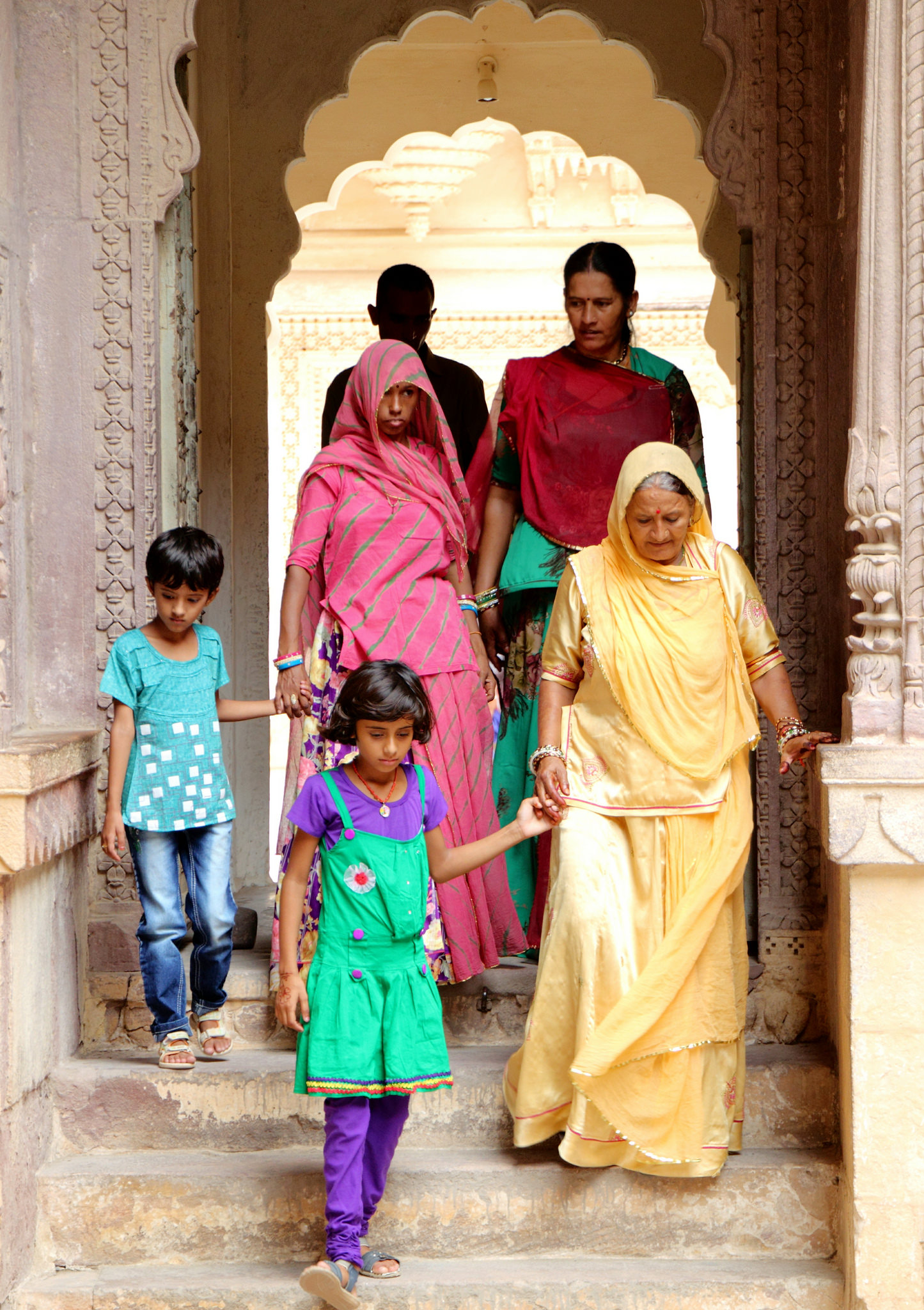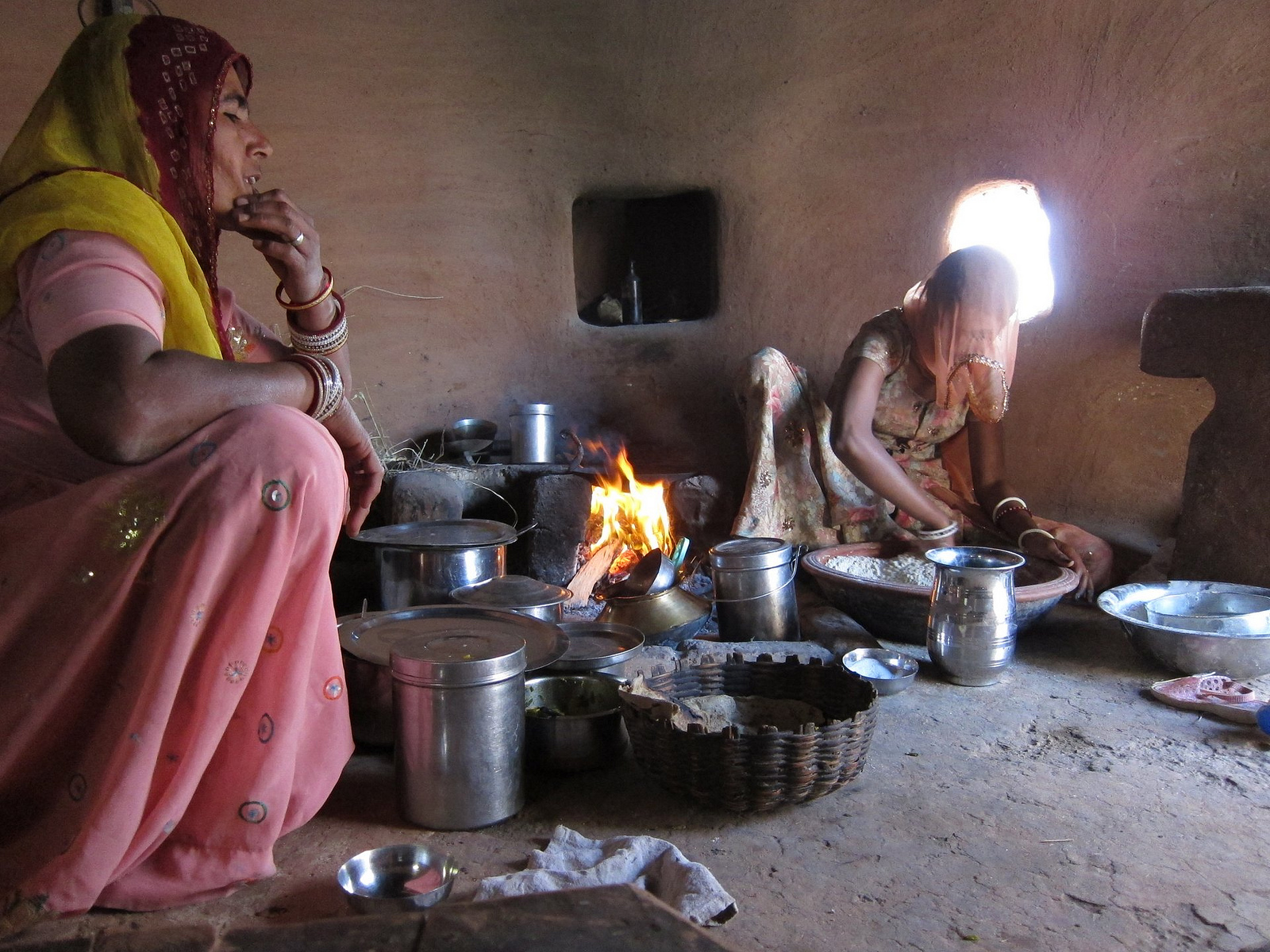More Reading Comprehension in Hindi Posted by Rachael on Jan 17, 2018 in Hindi Language, Uncategorized
This week, let’s continue to work on our reading comprehension skills with the third part of Mahadevi Varma’s (महादेवी वर्मा) short story, “Sister-in-Law” (Bhabhi/भाभी) from her collection of stories in Glimpses of the Past (अतीत के चलचित्र) (read parts 1 and 2 here). Like last time, try to read only the Hindi text first and make sense of the passage with the vocabulary I’ve provided in parentheses. Then, once you’ve figured out the general contours of what’s going on, complete the reading comprehension questions at the bottom. Lastly, read the English translation to see if your answers were correct.
Hindi Text
परन्तु कल्लू की माँ को चाहे उन आँखों की स्वामिनी (mistress) से मेरा परिचय न भाता हो; पर उसकी कथा सुनाने में उसे अवश्य रस मिलता रहा । वह अनाथिनी भी है और अभागी (ill-fated) भी । बूढ़े सेठ सबके मना करते करते भी इसे अपने इकलौते लड़के से ब्याह लाये और उसी साल लड़का बिना बीमारी के ही मर गया । अब सेठजी का इसकी चंचलता (volatility) के मारे नाक में दम है (to be plagued or worried to death) । न इसे कहीं जाने देते हैं, न किसी को अपने घर आने । केवल अमावस-पूनो (night of new moon) एक ब्राह्मणी आती है, जिसे वे अपने-आप खड़े रहकर सीधा दिलवा कर विदा का देते हैं ।
वे बेचारे तो जाति-बिरादरी (caste community) में भी इसके लिये बुरे बन गये हैं और इसकी निर्लज्जता देखो-ससुर (father-in-law) दुकान में गये नहीं कि वह परदे से लगी नहीं । घर में कोई देखनेवाला है ही नहीं । एक ननद (sister-in-law) है, जो शहर में ससुराल (father-in-law’s family) होने के कारण जब तब आ जाती है और तब इसकी खूब ठुकाई (beating) होती है, इत्यादि-इत्यादि सूचनाएँ कल्लू की माँ की विशेष शब्दावली और विचित्र भाव-भंगिमाओँ (peculiar or idiosyncratic behavior) के साथ मुझे स्कूल तक मिलती रहती थीं ।
परन्तु उस समय वे सूचनाएँ मेरे निकट उतना ही महत्त्व रखती थीं जितनी नानी से सुनी हुई बेला (jasmine) रानी की कहानी । कथा में बेचैन (uneasy) कर देने वाला सत्य इतना ही था कि कहानी की राजकुमारी की आँखें पुराने टाट के परदे से सुननेवाली बालिका को नित्य ताकती (gaze at, stare/peep) रहती थीं । यह स्थिति तो कुछ सुखद (pleasant) नहीं कही जा सकती । यदि सुनी हुई कहानी के सब राजा, रानी, राजकुमार, राजकुमारी, दैत्य (giant, monster), दानव (demon) आदि सुननेवालों को इस प्रकार देखने लगें, तो कहानी सुनने का सब सुख चला जावे, यह कल्लू की माँ की कहानी और परदे के छेद से देखने वाली आँखों ने मुझे समझा दिया था ।
भूरे टाट में जड़ी-सी वे काली आँखें मेरी कल्पना का विषय ही बनी रहतीं, यदि एक दिन पानी बरसने से कल्लू की माँ रुक न गयी होती, पानी थमते ही मैं स्कूल से अकेले ही न चल दी होती और गीली सड़क पर उस परदे के सामने ही मेरा पैर न फिसल (slip) गया होता । बच्चे गिर कर प्राय: चोट के कारण न रोकर लज्जा से ही रोने लगते हैं । मेरे रोने का भी कदाचित् यही कारण रहा होगा, क्योंकि चोट तो मुझे याद नहीं आती ।
कह नहीं सकती कि परदे से निकल कर, कब उन आँखों की स्वामिनी ने मुझे आँगन में खींच लिया; परन्तु सहसा विस्मय (astonishment, dismay) ने मेरी रुलाई (crying) रुक गयी । एक दुर्बल पर सुकुमार बालिका-जैसी स्त्री अपने अंचल से मेरे हाथ और कपड़ों का कीचड़ मिला पानी पोंछ (wipe) रही थी और भीतर दालान (hallway, corridor) से वृद्ध सेठ का कुछ विस्मित (astonished, taken aback) स्वर कह रहा था —“अरे यह तो वर्मा साहब की बाई है!”
उसी दिन से वह घर, जिसमें न एक भी झरोखा (lattice window) था न रोशनदान (skylight), न एक भी नौकर दिखाई देता था, न अतिथि और न एक भी पशु रहता था, न पक्षी, मेरे लिये एक आकर्षण बनने लगे । उस समाधि (place of burial, tomb)-जैसे घर मे लोहे के प्राचीर (rampart, hedge/fence) से घिरे फूल के समान वह किशोरी बालिका बिना किसी संगी-साथी, बिना किसी प्रकार के आमोद-प्रमोद (diversion, pastime) के, मानो निरन्तर वृद्ध होने की साधना (accomplish, study/learn) में लीन (engrossed) थी ।
वृद्ध एक ही समय भोजन करते थे और वह तो विधवा ठहरी । दूसरे समय भोजन करना ही यह प्रमाणित (prove, confirm) कर देने के लिये पर्याप्त (sufficient) था कि उसका मन विधवा के संयम (abstinence)-प्रधान (consisting predominantly of) जीवन से ऊबकर किसी विपरीत (unfavorable/inauspicious) दिशा में जा रहा है ।
प्राय: निराहार (fasting, starvation) और निरन्तर मिताहार (eating very little) से दुर्बल देह से वह कितना परिश्रम करती थी, यह मेरी बालक-बुद्धि से भी छिपा न रहता था । जिस प्रकार उसका खंडहर (mass of ruins)-जैसे घर और लंबे-चौड़े आँगन को बैठ-बैठ कर बुहारना (sweep, dust), आँगन के कुएँ से अपने और ससुर के स्नान के लिये ठहर-ठहर कर पानी खींचना और धोबी के अभाव में, मैले कपड़ों को काठ (piece of wood/log) की मोहरी (end) से पीटते हुए रुक-रुक कर साफ करना, मेरी हँसी का साधन (means, expedient) बनता था, उसी प्रकार केवल जलती लकड़ियों में प्रकाशित, दिन में भी अँधेरी रसोई की कोठरी (small or dark room) के घुटते (kneeling) हुए धुएँ में से रह-रह कर आता हुआ खाँसी का स्वर, कुछ गीली और कुछ सूखी राख से चाँदी-सोने के समान चमकाकर (burnish, polish) तथा कपड़े से पोंछकर (मारवाड़ में काम में लाने के समय बर्तन पानी से धोए जाते हैं) रखते समय शिथिल (slack, weak, tired) उँगलियों से छूटते हुए बर्तनों की झनझनाहट (ringing, resounding) मेरे मन में एक नया विषाद (despair) भर देती थी ।
English Translation
Although Kallu’s mother found the idea of introducing me to the mistress of those eyes unpleasant, she certainly relished telling me this woman’s tale. She (“Bhabhi”) was an orphan and an ill-fated wretch at that. Despite everyone’s persistent attempts to prevent it, the old Seth married her to his only son. And, that same year, without even catching an illness, the boy died. Now, because of this girl’s volatility, the Sethji was worried to death. He didn’t let her go anywhere, nor did he let anyone come to the house. A Brahmin woman came only on the night of the new moon; he alone stood waiting for her, gave her alms straight away and bid her goodbye.
That poor man got a bad name even in his own (caste) community because of her. And, just look at her shamelessness––her father-in-law has scarcely gone to the shop and already she’s fixed to the curtain. There isn’t even anyone in the house to supervise her. There’s the sister-in-law who, because she’s part of the father-in-law’s family in the city, gives her a thorough beating whenever she comes. Etcetera, etcetera––this kind of tittle-tattle, complete with Kallu’s mother’s particular vocabulary and peculiar expressions, accompanied me all the way to school.
But, at that time, these bits of gossip held as much significance to me as hearing my (maternal) grandmother’s story of the Jasmine Queen (Bela Rani). The tale’s disturbing truth was that, from behind the old sackcloth curtains, the princess’s eyes in the story incessantly gazed at the little girl who was listening. This situation could not exactly be called pleasant. If all of the kings, queens, princes, princesses, monsters, demons, etc. in a story began to stare at the listeners in this way, then all of the pleasure of hearing the story would vanish–––this truth was explained to me by Kallu’s mother’s story and those eyes, watching me from a hole in the curtains.
Those black eyes, as if fixed onto the brown sackcloth, would have remained only the subject of my imagination, if Kallu’s mother had not been able to drop by the school one day due to the rainfall–– if I had not set off from school by myself as soon as the rain stopped and if––– I hadn’t slipped on the wet street right in front of that curtain. Oftentimes when children fall, if not because of an injury, they start crying out of embarrassment. This was perhaps my reason for crying too because I do not recall an injury.
I can’t say when, emerging from behind the curtain, the mistress of those eyes pulled me into the courtyard. But, suddenly, my tears gave way to astonishment. A frail but delicate person, more girl than woman really, was wiping the muddy water from my hands and clothing with the end of her sari. And, from a hallway within, the elderly Seth was saying with a voice tinged with surprise––“Oh, this must be Varma Sahab’s little girl!”
From that day onward, that house, in which there wasn’t even a lattice window or a skylight, not even one servant or guest, nor even one pet or bird, began to hold a great attraction for me. In that tomb-like house, that young girl was akin to a flower that had fallen from a rampart of steel—without any companion or friend, bereft of any kind of diversion, she was as if continually engrossed in the business of getting older.
The elderly man ate only once a day, and she had the position of a widow in the household (and thus ate only once a day as well). To eat twice a day would be sufficient evidence to confirm that she had grown bored of a widow’s life of abstinence and was headed in some unfavorable direction.
Even with a body weakened by fasting and continually eating very little, she would often do so much hard labor––this couldn’t be concealed even from my childish mind. The way she squatted on her haunches sweeping the ruinous house and the spacious courtyard, the way she drew bucket after bucket of water for her own and her father-in-law’s baths from the well in the courtyard and, in the absence of a washer man, the way she beat the soiled clothing with the end of a wooden beam to clean it, stopping only momentarily–––made me laugh with astonishment every time. The sound of her coughing came from the cramped, dark room (even in the daytime) that was in the kitchen, illuminated only by smoldering logs, where she knelt, surrounded by smoke. With a mixture of wet and dry ashes, she would polish the gold and silver wares and wipe them with a cloth (in Marwar, utensils are washed with water before they are to be used). The ringing sound made by the utensils as her weary fingers relinquished them to their appointed places filled me with a nameless despair.
Reading Comprehension Questions:
१। सेठ जी के बेटे को क्या हुआ ? (Seth ji ke bete ko kyaa hua)?
२। आपको क्यों लगता है कि सेठ जी “भाभी” को लेकर इतने परेशान हैं ? वे उसे कहीं क्यों नहीं जाने देते? (Aapko kyoon lagtaa hai ki Seth ji “Bhabhi” ko lekar itne pareshaan hain? Ve use kahin kyoon nahin jaane dete)?
३। हमारी कथावाचक (narrator) “भाभी” को किस की तुलना करती है? कथावाचक पर इस तुलना का क्या असर पड़ता है? (Humaari kathaavaachak “Bhabhi” ko kis ki tulnaa karti hai? Kathaavaachak par is tulnaa kaa kyaa asar partaa hai)?
४। कथावाचक की राय में, “भाभी” कैसी व्यक्ति है? कथावाचक को लगता है कि “भाभी” इस बुरी स्थति के लायक है या निर्दोष है? (Kathaavaachak ki raay me, “Bhabhi” kaisi vyakti hai? Kathaavaachak ko lagtaa hai ki “Bhabhi” is buri stithi ke laayak hai ya nirdosh hai)?
५। कल्लू की माँ “भाभी” के बारे में क्या सोचती है ? (Kallu ki Ma “Bhabhi” ke baare me kyaa sochti hai)?
७। इस कहानी में, हमें कभी नहीं पता चला कि “भाभी” का असली नाम क्या है । इसका क्या महत्त्व है इस कहानी में? (Is kahaani me, hume kabhi nahin pataa chalaa ki “Bhabhi” ka asli naam kyaa hai. Iskaa kyaa mehetva hai us kahaani me)?

Build vocabulary, practice pronunciation, and more with Transparent Language Online. Available anytime, anywhere, on any device.






